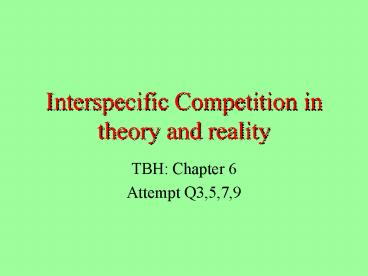Interspecific Competition in theory and reality - PowerPoint PPT Presentation
1 / 24
Title:
Interspecific Competition in theory and reality
Description:
'A struggle for existence inevitable follows from the high rate at which all ... When grown alone both diatoms diminish the ... Darwin's Finches in Galapagos ... – PowerPoint PPT presentation
Number of Views:42
Avg rating:3.0/5.0
Title: Interspecific Competition in theory and reality
1
Interspecific Competition in theory and reality
- TBH Chapter 6
- Attempt Q3,5,7,9
2
Graveyard Lab
3
A struggle for existence inevitable follows from
the high rate at which all organic beings tend to
increase Chapter III
4
Competition is the engine of Natural Selection
5
Competition in action Example 1
When grown alone both diatoms diminish the
resource silica ?
?
?
When grown together one diatom drives its
competitor extinct ?
?
?
6
Competition in action Example 2
Larvae settle in Balanus zone but are outcompeted
Zonation patterns of barnacles determined by
conditions or competition?
Desiccation
?
?
7
(No Transcript)
8
General Observations on Competition
- Species that overlap in geographical range may
divide space on a finer scale - Species are excluded from sites where conditions
are suitable for them. - There is a difference between fundamental niche
and realized niche - Competition can be very one sided
- Competition is very difficult to demonstrate
9
Competition in action Example 3
Alone both bumblebees can exploit both flowers
Together they are forced to specialize
What is the fundamental niche? What is the
realized niche?
10
Coexistence can be attained when 2 species
specialize on separate resources
At low levels of silica Cylotella excludes
Asterionella?
?
?
At low levels of phosphate Asterionella
exludesCylotella ?
Notice all the examples so far have been
competition between close relatives
11
Competition between 2 unrelated taxa, ants and
rodents, resulted in a division of resources
?
?
In the presence of the competitor the populations
diet was restricted and the abundances were lower
12
Competitive Exclusion(Gauses Principle)
- If 2 species coexist in a stable environment,
they do so as a result of niche differentiation - If there is no differentiation then one species
will eliminate the other - N.B If species are coexisting with different
niches it does not mean that this is the
principal in operation
13
Environmental Heterogeneity
- Exclusion of one species by another will occur if
competition has run its course (referred to as
Equilibrium) - We have already seen from the Holling lazy eight
succession model that we might anticipate
environments to be dynamic and heterogeneous.
That is, habitats can be patchy
14
Because of its higher fecundity and earlier
maturity Physa the poorer competitor to Lymnaea,
persists by reproducing early in temporary ponds
Physa surviving in ephemeral ponds
Time
15
Evolutionary Impacts of Interspecific
Competition Evolution in Action
We might expect species to avoid competition,
however each time we see niche differentiation we
must confirm that it is competition driving the
differences
Benthic
Limnetic
Evidence from sticklebacks in freshwater lakes of
character displacement
16
Darwins Finches in Galapagos
Where G. fortis and G. fulginosa co-occur there
is a shift in beak size
17
Interspecific Competition How may it structure
biological communities?
- Community an association of interacting species
living in a particular area also often defined
as all the organisms living in a particular area - Community structure attributes of a community
such as the number of species or the distribution
of individuals among species within a community
18
Interspecific Competition How may it structure
biological communities?
Index of Seed Size
Body Size
Species of ant specialized of on different seed
sizes
19
Community structure e.g. 1
Coexistence at a particular body size is
facilitated by alternative foraging techniques
G - Group foraging
I - Individual foraging
The guild as a whole demonstrates niche
complementarity
20
Community structure e.g. 2
Niche Complementarity among nectar feeding
bumblebees
4 groups of bumblebees
Long Proboscis
?
Medium Proboscis
?
Short Proboscis
?
Robber
?
21
Interspecific competition plays a role in
structuring communities by acting within guilds
(groups of organisms exploiting the same class
of resource in a similar fashion)
22
Community structure e.g. 3
Patterns of co-occurrence on very local scales
examined for plants living in very similar soil
Where the plants are unlikely to be found
together more often than not they have similar
niches
23
Plants have very similar niche requirements and
there is less scope for resource partitioning
experiments can elucidate the effects of
competition for light and nutrients
Alone
Roots
Shoots
Both
24
Surveys of competition show that it is prevalent,
but its extent may be exaggerated by a failure to
publish results documenting its unimportance































